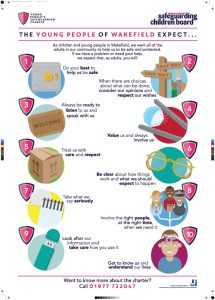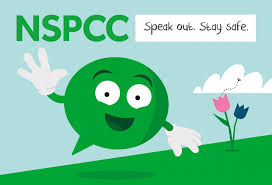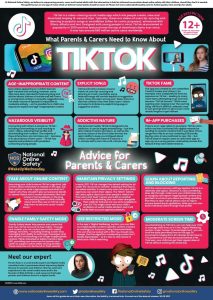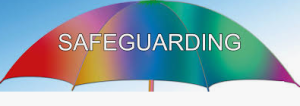
At King’s Meadow Academy, keeping our children safe is of vital importance and is a significant part of school life.
For further information about how we keep children safe, read our Safeguarding Policy: KMA Child Protection Policy 24-25
If you have any concerns about either your own child or another child in school, please do not hesitate to come into school and speak to us. We are always happy to help.
Our Safeguarding Team:
Designated Safeguarding Lead: Mr Gough (Headteacher)
Deputy Designated Safeguarding Leads:
Mr Wright (Deputy Headteacher)
Mrs Moore (EYFS Leader)
Miss Radford (Learning Mentor)
Our safeguarding email address which is monitored throughout evenings, weekends and school holidays is safe.kma@watertonacademytrust.org
Our designated safeguarding governor is Mr Mann-Tighe
Please remember that if a child is in immediate danger, an emergency call should be made (999 on the telephone).
King’s Meadow Academy is committed to safeguarding and promoting the welfare of children and young people and expects all staff and volunteers to share this commitment
 Further information about safeguarding children can also be found by following the link below:
Further information about safeguarding children can also be found by following the link below:
If you have safeguarding concerns about a child, please contact Wakefield Multi Agency Safeguarding Hub (MASH) for consultation and advice on 03458 503 503.

King’s Meadow Academy uses CPOMS software to monitor Safeguarding, Wellbeing & Pastoral Issues.(a ‘Child Protection Online Monitoring System’) is an application for monitoring child protection, safeguarding, and a range of other welfare issues. It supports us in our efforts to ensure that safeguarding is robust.
The CPOMS system allows the De
signated Safeguarding Lead (DSL) and the Deputy DSLs quickly, easily and securely record in one place all of the safeguarding information that the school has on a child. The order in which reports are made about a student (the student’s ‘chronology’) is built automatically and so trends are much easier to spot than if the information had been recorded on several pieces of paper.
All adults in the school can access the system to make a referral, allowing the DSL/Deputy DSLs to focus on taking appropriate follow-up action thereafter. All referrals to external agencies such as Children’s Services, CAMHS, the police, etc. are tracked easily and the system alerts us if timescales are not being met.
The information on the system can be interrogated quickly and easily. This also allows for easy reporting to Governors.
Filtering and Monitoring
Parents can be reassured that at King’s Meadow Academy we employ the highest quality filtering and monitoring systems to mitigate the risks of our children’s online safety. The school uses a system employing a continuously updated series of keywords and watchwords to filter the content of the internet from any of the machines within the school system. Although no system is perfect, this has provided the highest quality of control on internet provision in school.
Children will be asked to explore an increasingly wide range of websites and digital content and will be required to use search engines to develop their skills as a digital citizen – using these systems of filtering and monitoring we feel secure in exploring the online world, giving us opportunities to learn about online risks as we progress through school. Internet safety is a huge part of our school curriculum and we challenge children to think about the key themes of content, contact, conduct and contract which form the four main areas for online safety. We believe that this gives them the best preparation for digital citizenship of the future.
Please remember to apply appropriate settings to children’s devices when they are using the internet at home or on mobile devices. Please refer to advice and guidance to ensure children’s devices are appropriately managed.
Operation Encompass
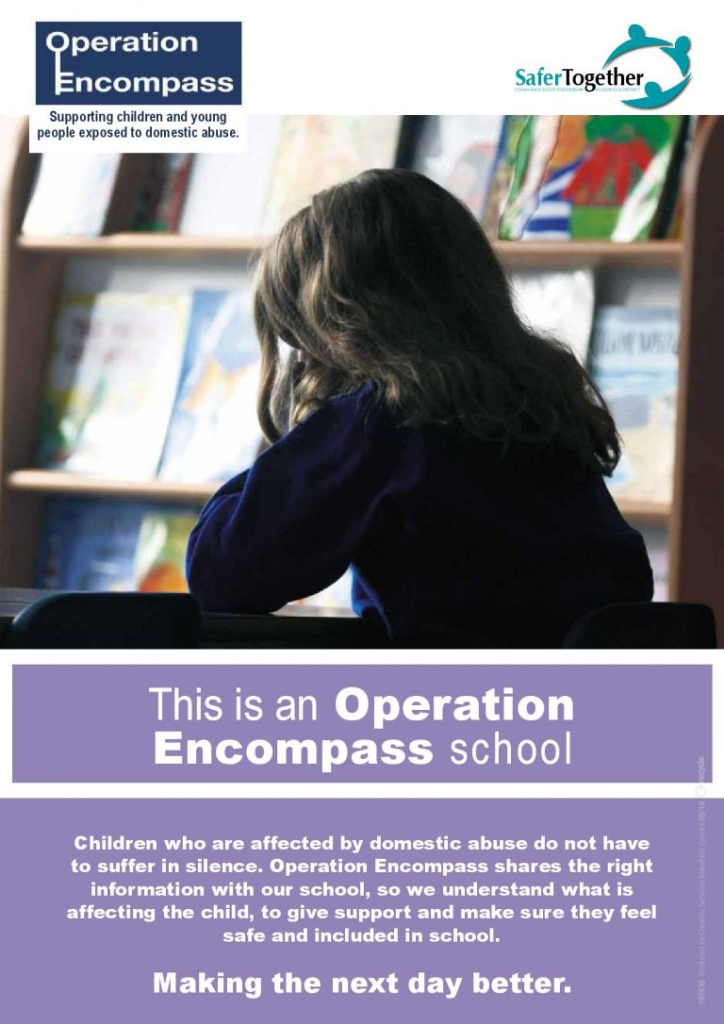
Our school is part of Operation Encompass which is a national scheme that operates jointly between schools and police forces.
Operation Encompass is the reporting to schools, prior to the start of the next school day, when a child or young person has experienced domestic abuse.
As a school we have ensured that a member of our staff, (Designated Safeguarding Lead) known as a Key Adult, has been trained in the Operation Encompass procedures allowing us to then use the information that has been shared, in confidence, to support the child/ren in our care.
The Domestic Abuse Act 2021 identifies children who experience domestic abuse as victims of domestic abuse in their own right.
We are keen to offer the best support possible to all our pupils and we believe this will be extremely beneficial for all those involved.
Wakefield-Charter
Safeguarding and promoting the welfare of children is defined as: protecting children from maltreatment; preventing impairment of children’s health or development; ensuring that children grow up in circumstances consistent with the provision of safe and effective care; and taking action to enable all children to have the best outcomes.
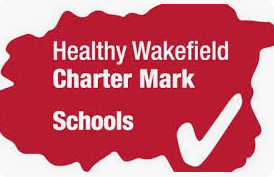
Safeguarding is not just about protecting children from deliberate harm. It relates to aspects of school life.
The PREVENT duty
From 1 July 2015 all schools are subject to a duty under section 26 of the Counter-Terrorism and Security Act 2015, in the exercise of their functions, to have “due regard to the need to prevent people from being drawn into terrorism”. This duty is known as the Prevent duty.
Please see below for our Prevent Risk Assessment for the 2024-25 academic year. You can also find this in our policies section of the website as well:
Prevent Risk Assessment – 24-25
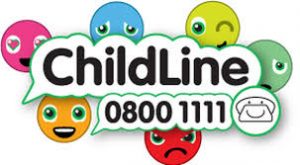 Child Line Website – https://www.childline.org.uk/get-support/contacting-childline/
Child Line Website – https://www.childline.org.uk/get-support/contacting-childline/
NSPCC
Home Alone? An NSPCC leaflet to help you decide when it is safe for your child to be at home on their own Home alone
Early Help Offer : http://earlyhelp.wakefield.gov.uk/
Wakefield Safeguarding Children Partnership: https://www.wakefieldscp.org.uk/
Worried about a child?: http://www.wakefieldscp.org.uk/worried-about-a-child/
E-safety and Useful Websites for Parents / Carers
Please click on the hyperlinks below for further information:
CEOP Online Reporting
Are you worried about the way someone has been communicating with you online?
Make a report to one of CEOP’s Child Protection Advisors
Educate Against Hate
Government advice and trusted resources to safeguard young people from radicalisation, build resilience to all types of extremism and promote shared values.
E-safety Information for Parents of the Under 5’s
Frequently asked questions, information and tips to help keep under 5’s safe online.
National Online Safety – 7 Questions to help you start a conversation with your child about online safety
7 questions that will help you start an initial conversation with your child, so you have a better understanding of what they do online and how you can protect them.
O2 and NSPCC Helpline Poster
Some issues are easier to talk through. So O2 and NSPCC have set up a free helpline to help keep children safe online.
Parentinfo.org
Parent Info is a collaboration between Parent Zone and NCA-CEOP, providing support and guidance for parents from leading experts and organisations.
Place2be
Provides mental health support in schools through one-to-one and group counselling using tried and tested methods backed by research.
Prevent Awareness Pamphlet for Parents
Prevent is a government strategy designed to prevent the support of extremist causes.
Share Aware Booklet
We tell children it’s good to share, but online it’s different. That’s why we’re asking parents and carers to be Share Aware.
Social Media Age Restrictions Guide for Parents
Are you aware of the minimum age for account numbers on popular social media sites and apps?
Social Media Guidance for Parents
A practical guide for parents and carers whose children are using social media.
Teaching Online Safety in School – DfE
Guidance supporting schools to teach their pupils how to stay safe online, within new and existing school subjects.
Wakefield Safeguarding Children Partnership
The Wakefield Safeguarding Children Partnership (WSCP) is a partnership of all of the relevant statutory, voluntary and community agencies involved in safeguarding and promoting the welfare of all children and young people living in Wakefield.
The WSCP is the key statutory mechanism for agreeing how the relevant children’s organisations in Wakefield co-operate to safeguard and promote the well-being of children and young people and to ensure the effectiveness of the work they carry out.
Watch with your child – ages 4 to 7 years – to learn about Esafety – Jessie and Friends
This series of three animations aims to give 4-7 year olds knowledge, skills and confidence to help them respond safely to risks they may encounter online.
Watch with your child – ages 7 to 11 years – to learn about Esafety – The adventures of Kara, Winston and the Smart Crew
These cartoons illustrate 5 e-safety SMART rules and include a real life SMART Crew of young people, who guide the cartoon characters in their quest, and help them make safe online decisions.
WF-I-Can
WF-I-CAN is a place to find information and advice as well as self-help tips that can increase confidence and resilience. This can be accessed at Homepage – WF-I-Can
Your Child’s Online World Booklet O2 and NSPCC
This booklet offers some simple guidance about the risks your child might face online, some advice about what you can do to keep them safe, and where you can go for more help and support.
Wakefield Families Together brings services together, to join up how we work, so that it’s easier for you to find and access the support you need, at the earliest opportunity.
So, when you do and find it hard to deal with a difficult situation, or have worries around family relationships, behaviour, school attendance, emotional and mental health, domestic abuse, parental conflict, housing issues, or employment and debt problems, Family Hubs can help direct to the right people and services.
We call this ‘early help’. Clicking on the link above will take you straight to the WFT page where you can find more advice and information.
WDDAS (Wakefield District Domestic Abuse Service)
Everyone has the right to live a life free from fear and abuse.
If you are in immediate danger, please call the police on 999.
If you would like support and advice around domestic abuse you can call our helpline on 0800 915 1561. Or you can e-mail domesticabuse@wakefield.gov.uk. Hours are Monday to Thursday 8.30am – 5pm and Friday 8.30am – 4.30pm.
Child Exploitation
Child exploitation is child abuse.
There are different types of behaviours linked to a child being exploited, all of which you can access from our new Knowledge Hub, and in particular, our new, Speak Up. Stand Up. Stop Exploitation pages!
The Wakefield Children’s Safeguarding Charter
King’s Meadow Academy has signed up, supports and follows ‘The Children and Young People’s Safeguarding Charter’, an agreement which we are committed to putting into practice and applying its principles.
The Charter was officially launched by Wakefield & District Safeguarding Board, in May 2016, in conjunction with more than 200 young people across the authority, who gave their views and ideas.
The document below outlines the expectations of how schools, health and social care agencies, as well as the police, can support young people in enabling them to thrive and achieve. Young people have stressed that they want to be listened to, kept safe, taken seriously and be treated with care and respect.
Wakefield Children’s Charter Information Booklet
The Charter also sets out a series of pledges that apply to all staff working with young people, including making a personal commitment to be professional, to be trained, to know what to do and to show respect and understanding.
